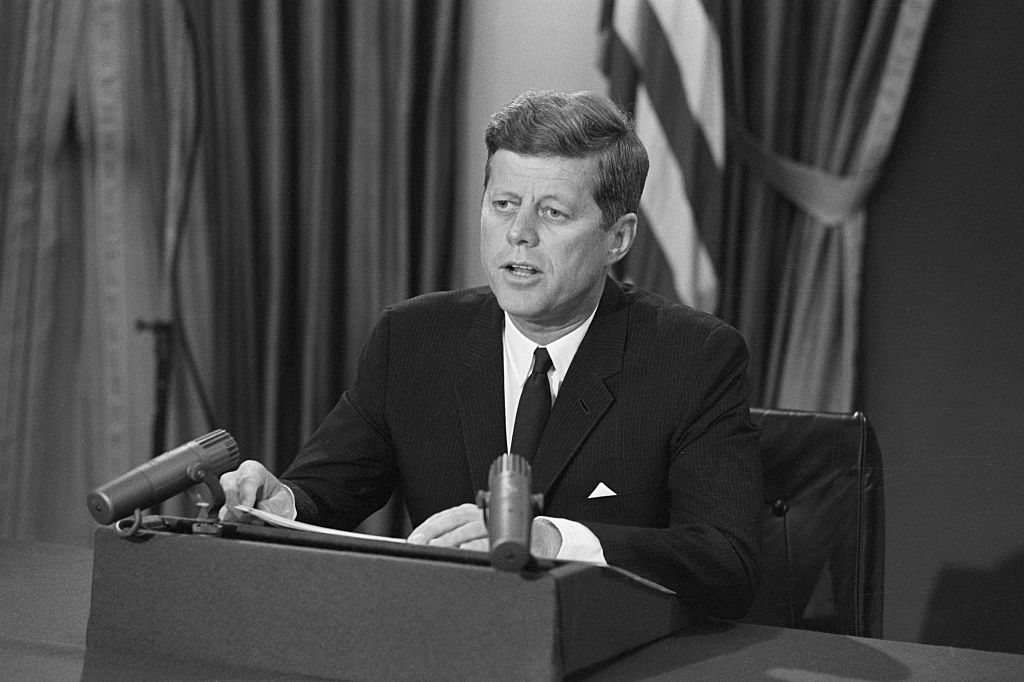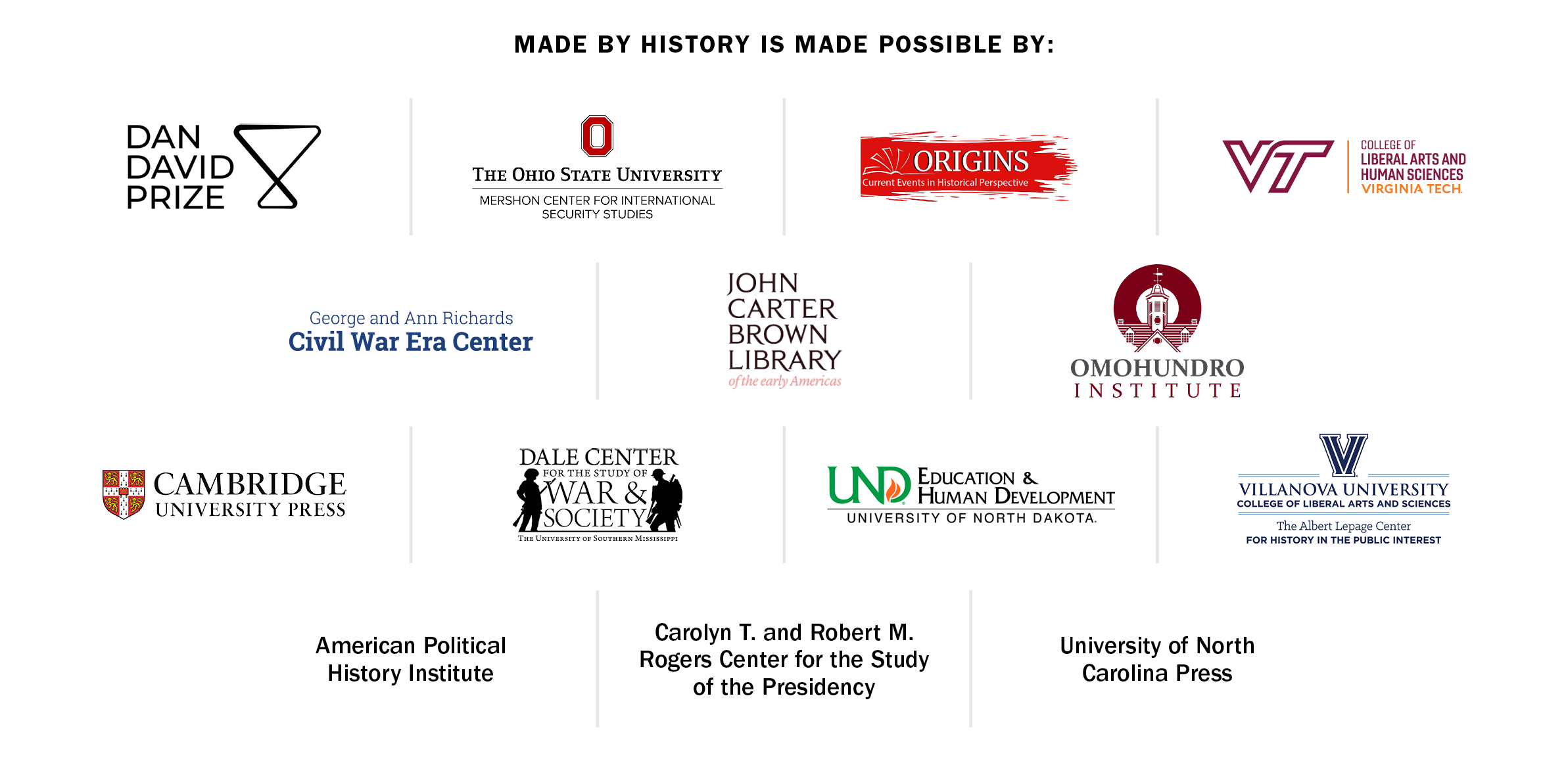
Although most Americans today have no living memory of President John F. Kennedy, we are reminded of his assassination this week, as we have been every year since November of 1963. No incontrovertible new evidence about the Kennedy assassination has emerged in six decades. Speculation and conspiracy theories about “what really happened” abound and continue to fascinate. They do so at the expense of what is truly worth remembering and memorializing about Kennedy’s final months as president.
In the summer and fall of 1963, Kennedy called upon Americans to address what he described as a “moral crisis” confronting the nation—the continued reality of racial injustice in the United States. The steps he took and the message he conveyed made a deep impression on his fellow citizens. They remind us today of how consequential a President’s words, demeanor, and approach to a riven citizenry can be at difficult turning points in the nation’s history.
In 1963, racial segregation was still very much alive in the United States despite numerous federal court decisions striking down Jim Crow laws and practices, including the 1954 landmark Brown v Board of Education Supreme Court decision. Kennedy, notwithstanding his campaign promises, had acted only haltingly. Mass protests that spring organized by civil rights activists in Birmingham and other cities dramatically catapulted the struggle against racial injustice onto the national stage. To widespread public horror, local officials in Birmingham had brutally loosed police dogs and fire hoses against demonstrators, including children.
Moral outrage did little to quell the continued resistance of ardent segregationists. June brought George Wallace’s infamous “stand in the schoolhouse door” when, in defiance of both a May federal district court desegregation order and the Kennedy Justice Department, Alabama’s Governor sought to prevent the enrollment of Vivian Malone and James Hood, two African American students, at the state university. Even as Wallace was forced to retreat, he vowed to fight further “federal interference” in his state and “the trend toward military dictatorship in this country.”
Read More: What These 3 Longstanding JFK Myths Reveal About America
On June 11, 1963, the very evening of the showdown with Wallace, President Kennedy delivered a remarkable televised speech on civil rights. It was the first presidential address to the nation explicitly characterizing and condemning at length segregation as a moral wrong, unworthy of a great country. “One hundred years of delay have passed,” Kennedy reminded the nation, “since President Lincoln freed the slaves, yet their heirs, their grandsons, are not fully free. They are not yet freed from the bonds of injustice. They are not yet freed from social and economic oppression. And this Nation, for all its hopes and all its boasts, will not be fully free until all its citizens are free.” Kennedy further promised to introduce a sweeping civil rights bill which would take aim at the heart of Jim Crow.
Before Kennedy had even finished speaking, telegrams flooded the White House from citizens moved by his remarks.
The sentiments they expressed ranged from outrage to exhilaration. One segregationist mused, “I wish you’d take a night off and go to the theater like Lincoln did and then you wouldn’t have any more problems. Neither would we.” Another critic requested, “Please reconsider and don’t introduce your civil rights legislation in Congress because I may want the privilege of throwing you out of my business one day.” He added, “People are fed up with the K-K-K from Washington – Kennedy - Kennedy + King Klan.” A woman who took pains to identify herself as a mother promised Kennedy that she would pray every night that the President would see the error of his ways. If he did not, she continued, “I pray that the Lord will strike you dead before you can lead this country to destruction by these immature and forced actions.”
Many African Americans, whose plight the president’s speech sought to redress, responded with gratitude and admiration. One confessed, “You are fulfilling my hopes and dreams as I knew you would. Being a Negro, I know the embarrassment, frustration, anger and hurt that we as a race must suffer. I am glad to know that there are better days ahead for my children.” “Your speech tonight was a profile in courage,” another woman wrote. “May the infant Jesus sustain you as you go forth to be crucified.” Myrlie Evers, then a young wife and mother, watched Kennedy’s speech in her home in Jackson, Miss., as she waited for her husband Medgar to return home from his duties as the state’s NAACP field secretary. The President’s remarks, she would remember, “moved me and gave me hope and made the work Medgar was doing seem more important than ever.” Within hours an appalling act of violence took her husband’s life when a Ku Klux Klansman murdered Medgar Evers in his driveway near midnight.
Evers’ murder highlighted the real danger faced by movement leaders and the urgency the moment demanded. In the following weeks, activists finalized plans for a March on Washington for Jobs and Freedom to pressure Congress to enact the legislation called for by President Kennedy and to ensure the bill had teeth.
As anticipated, Kennedy’s commitment had immediate political repercussions. “This is a civil wrongs bill, not a civil rights bill,” said Senator Richard B. Russell, a Georgia Democrat. Debates over the proposed bill threatened Democratic Party unity in Texas and the president’s hopes for reelection, prompting plans for a multi-city peacekeeping visit to the Lonestar State that November to mend fences. Enthusiastic crowds greeted President and Mrs. Kennedy in San Antonio, Houston, Fort Worth, and Dallas. The tragic end of that journey at Dealey Plaza and the brutal assassination of the nation’s youngest-ever elected president failed to quench the era’s heated rhetoric, and in fact, only seemed to intensify it.
Read More: How Robert F. Kennedy Shaped His Brother's Response to Civil Rights
After Kennedy’s death, the grief that engulfed the nation prompted a new flood of letters to the White House—this time directed to the president’s widow and children. The arrest and murder of alleged assassin Lee Harvey Oswald did not allay the soul searching expressed by citizens who worried about the state of their country.

Among the messages sent to the White House was an “epitaph” written by Martin Luther King Jr. and published in the Southern Christian Leadership Conference’s newsletter. He lamented, “Our late President was assassinated by a morally inclement climate. It is a climate filled with heavy torrents of false accusation, jostling winds of hatred and raging storms of violence. It is a climate where men cannot disagree without being disagreeable, and where they express dissent through violence and murder.”
Another young woman expressed this sentiment more personally: “The reason that all men mourn the death of your husband is because we feel that we have played a part in his murder. We may not have been there, or even known that you were there but we are all responsible because we did not fight with him in everything he stood for, we just sat back and watched. We have wasted a great man. We may not realize that fault now, but in time, history will write its own story on blood filled pages.”

As we reflect on the death of President Kennedy, we should recall that amid the turmoil of his times, he found the determination to lead the nation forward despite profound divisions within the country. If lingering questions around the circumstances of his death remain, they should not obscure what we do know from the letters written to Kennedy in the last months of his life and to his widow and children after his death. “A great change is at hand,” he instructed Americans in his civil rights speech—a prospect that inspired hope in many and that would be, in a measure, fulfilled when his successor, Lyndon Johnson, signed the Civil Rights Act of 1964 nearly eight months after Kennedy’s assassination. Transformational changes, though incomplete, would follow in the ensuing decades even though the promise of racial equality has yet to be achieved. That, as much as any smoking gun evidence that may never materialize, is truly worth remembering this Nov. 22, 2023.
Sharron Wilkins Conrad is an associate professor of history at Tarrant County College, a senior fellow at Southern Methodist University’s Center for Presidential History and the former Director of Education at The Sixth Floor Museum at Dealey Plaza. She is completing a book manuscript entitled The Trinity: John Kennedy, Lyndon Johnson, and Their Civil Rights Legacies in African American Imagination. Ellen Fitzpatrick is presidential chair and professor of history, Emerita at the University of New Hampshire. She is the author and editor of several books including Letters to Jackie: Condolences from a Grieving Nation and The Highest Glass Ceiling: Women’s Quest for the American Presidency.
Made by History takes readers beyond the headlines with articles written and edited by professional historians. Learn more about Made by History at TIME here.
More Must-Reads from TIME
- Why Biden Dropped Out
- Ukraine’s Plan to Survive Trump
- The Rise of a New Kind of Parenting Guru
- The Chaos and Commotion of the RNC in Photos
- Why We All Have a Stake in Twisters’ Success
- 8 Eating Habits That Actually Improve Your Sleep
- Welcome to the Noah Lyles Olympics
- Get Our Paris Olympics Newsletter in Your Inbox
Write to Sharron Wilkins Conrad and Ellen Fitzpatrick / Made by History at madebyhistory@time.com
